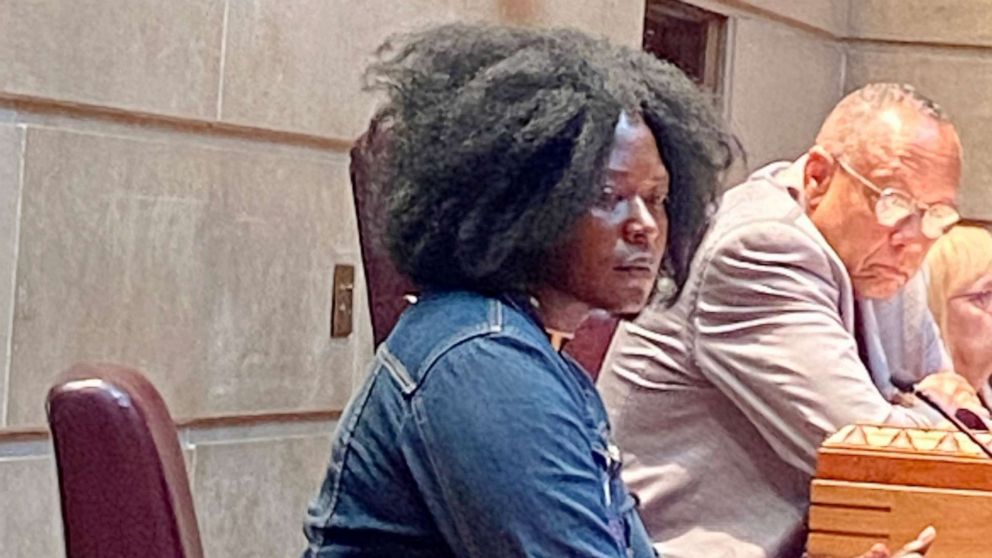(BUFFALO, N.Y.) — Prompted by the racially motivated mass shooting in May that left 10 Black people dead and three other people injured, the federal Equal Employment Opportunity Commission held a listening session in Buffalo on Monday to hear from loved ones of the victims who pointed out in emotional statements that systemic racism played a major role in the massacre.
It was the first time since 2015 that the EEOC panel has held a meeting outside of Buffalo. The panel’s chair, Charlotte A. Burrows, vowed to incorporate what the commission learned into its multi-year strategic enforcement plan.
“Like most of America, I mourned the tragedy and condemned that vicious attack in Buffalo in May. And it claimed the lives of 10 innocent people,” Burrows said in an opening statement. “But to illuminate the underlying injustice and racism that helps create the conditions for racially motivated violence and discrimination, we also need sustained, thoughtful and persistent action. Grief and anger are not enough.”
Garnell Whitfield, a retired Buffalo fire commissioner whose 86-year-old mother, Ruth Whitfield, was among those killed in the rampage at the Tops supermarket in the predominantly Black neighborhood of East Buffalo, told the commission that racism just didn’t suddenly rear its ugly head on May 14.
“I brought only my lived experiences to share with you because I want you to know what it feels like to be traumatized in this manner, not just on May 14, but every day of your life just because of the color of your skin,” Whitfield said.
He said that as a teenager, he was wrongfully accused of robbery and abused by white police officers. He said that a fire department company officer attempted to sabotage his ability to join the fire department in the 1980s.
Whitfield said that while he might appear to be successful on the surface, his reality is a different story.
“The truth is, I, like every other Black American, is a victim and survivor of racism, treated differently and put under constant pressure to be quiet and ignore the incessant barrage of biases, implicit and otherwise, just to get along, just to fit in — and just maybe get a piece of that so-called dream that you’ve been taught to believe in,” Whitfield said. “The problem is, reality keeps waking you up.”
He went on, “I felt it was important for you to know what we go through. No matter what opportunity you provide for us, we come to that opportunity with baggage, with trauma. Our communities have been traumatized. All of the statistics, all of the things that you hear, this didn’t just start on May 14. We’ve been living with this our entire lives.”
Zaneta Everhart, whose 20-year-old son Zaire Goodman was wounded in the attack, also addressed the commission, saying, “It boggles my mind that I sit here before you today saying the same things that Black people have been saying for centuries.”
“What is happening in my community and communities just like the East Side of Buffalo all across the country is violence,” Everhart said. “The starvation of resources, the lack of education, the poor health system, the dilapidated housing, few employment opportunities, food insecurity, limited transportation, redlining, not having enough green space. Not having sidewalks. This is violence.”
She said her son is now living with the results of decades of inequality and unchecked racism.
“The world we live in is by design. Systemic racism is a calculated construct. That is why it was so easy for the terrorist to find the Black people here in Buffalo and cause terror,” Everhart said.
She said her son, who was working at Tops the day of the attack, was shot in the neck and will have to live with shrapnel in his body for the rest of his life.
“He is left with the memory of feeling his flesh being torn open by a bullet from an AR-15,” she said. “He is also left with the memory of seeing an elder from his community, who he says was a wonderful woman, being shot and killed right in front of him as well as the memory of bodies lying dead in the parking lot of the grocery store where he was employed. So, therapy will now be a normal part of his healing journey.”
But she also told the commission that her ability to stay strong comes from the resilience of her son.
“Seeing the way that Zaire has handled all of this has given me the strength to advocate for change,” Goodman said. “The first thing Zaire said to me after he was shot while lying in the hospital bed was, ‘Mom, I knew I’d be fine."”
She added, “He is resilient. Besides going to doctors, his first time really getting out of the house was 15 days after the massacre and he wanted to go to the memorial in front of Tops to put flowers down.”
She said her son is also pleased that the Tops store, the only large grocery market in East Buffalo, has reopened.
“While he realizes that the scene there is a source of pain for so many in the community, he feels that the reopening of the store shows the terrorist that he cannot destroy our community,” Goodman said.
Copyright © 2022, ABC Audio. All rights reserved.












